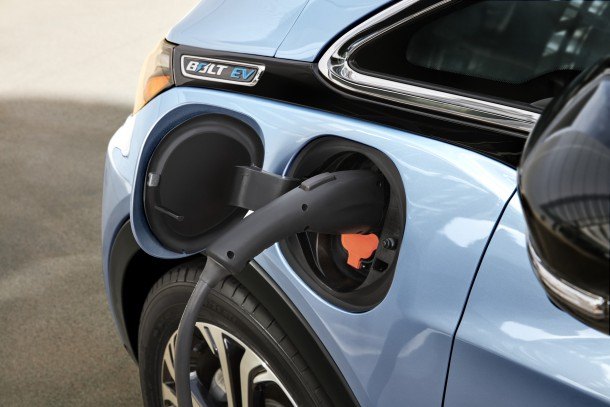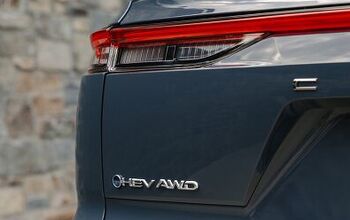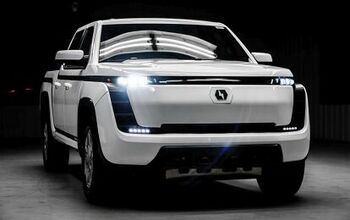A Worst-case Scenario for Green Types Would Put EV Sales Predictions to the Test

Politicians walk back policy promises as frequently as Ram announces special edition 1500s, so it’s not unwise to take campaign pronouncements with a big grain of salt.
Environmentalists and those close to the electric car sphere aren’t happy right now, as Donald Trump’s ascendancy to the Oval Office could put the kibosh on green ambitions. There’s talk of a rollback of fuel economy targets, of California no longer being allowed to be “special” (at least, when it comes to auto industry regulation) — basically, the sky could be falling, but they aren’t sure if it is yet.
Let’s take that frenzied speculation to its natural conclusion. Say the sky falls, environmental regulations are left gutted like tuna on a wharf, and the government incentives to buy an electric vehicle dry up.
Can EVs stand on their own?
John Voelcker, writing in Green Car Reports, claims we could be on the cusp of learning whether they can or can’t. Admitting there’s nothing but uncertainty surrounding the issue, Voelcker says a worst-case scenario would be a “genuine market test for the appeal of plug-in electric cars.”
Certainly, for almost their whole existence (this century, anyway), EVs have rolled off dealer lots with varying amounts of MSRP-lowering government cash hiding in the glove box. This isn’t just an American problem, if you choose to call it a “problem”. Governments everywhere have used taxpayer money to spur the adoption of EVs, and consumer take-up has always fallen short of predictions.
That’s not to say people aren’t buying them. Year-to-date sales of battery electric vehicles in the U.S. are up 12.6 percent compared to the same period in 2015, but still we’re talking less than one half of one percent of market share. Still, ever-increasing ranges have helped grow an image of viability, and a looming crop of affordable models with 200-plus-mile ranges seem capable of attracting wider interest and busting the “niche” label.
The first of those models — the 2017 Chevrolet Bolt — should trickle onto lots by the end of the year. Perfect timing, if indeed the doomsayers are correct.
“Advocates have long said that when electric cars with 200 miles or more of range enter the market at affordable prices, their obvious advantages will produce a large natural buyer base and sales will increase,” Voelker writes, adding that a Trump administration could “test the truth of some advocates’ assertions.”
Even in the absence of pro-green regulations, logic states that EVs could still find fans if they’re practical, affordable, and have the infrastructure to support them. (A sharp and lengthy rise in fuel prices could help, too.) The infrastructure has been slow to roll out, despite recent efforts by the federal government to make long-distance EV driving practical.
Actually, you needn’t take logic’s word for it. A study published earlier this year quizzed Northeastern and California drivers on the topic of plug-in electric vehicles. When asked how likely they were to consider a battery electric vehicle as their next car purchase, 45.23 percent of Northeastern respondents said it was “very unlikely.” Another 14.41 percent it would be somewhat unlikely. Just over 8 percent of respondents said an EV purchase was very likely.
California respondents seemed more favorable to the idea, but roughly 46 percent still classified an EV purchase as somewhat or very unlikely.
When asked what attributes would make them more likely to purchase one, respondents on both coasts listed a lower purchase price as No. 1. Coming in second was increased range, followed by more plug-in points.
Interestingly, a slim majority of Northeastern drivers (55.07 percent) wanted government policies to make it easier to own an EV. More Californians (60.32 percent) felt this way. With price being consumers’ biggest consideration, that likely means tax credits or other subsidies.
EVs seem poised to enter that Goldilocks zone of acceptable price, range and (to a lesser degree) infrastructure support, so we’ll soon know whether the new crop sinks or swims in the domestic market. As for the sky falling, time will tell if we get that “genuine market test.”
[Image: General Motors]

More by Steph Willems
Latest Car Reviews
Read moreLatest Product Reviews
Read moreRecent Comments
- Formula m How many Hyundai and Kia’s do not have the original engine block it left the factory with 10yrs prior?
- 1995 SC I will say that year 29 has been a little spendy on my car (Motor Mounts, Injectors and a Supercharger Service since it had to come off for the injectors, ABS Pump and the tool to cycle the valves to bleed the system, Front Calipers, rear pinion seal, transmission service with a new pan that has a drain, a gaggle of capacitors to fix the ride control module and a replacement amplifier for the stereo. Still needs an exhaust manifold gasket. The front end got serviced in year 28. On the plus side blank cassettes are increasingly easy to find so I have a solid collection of 90 minute playlists.
- MaintenanceCosts My own experiences with, well, maintenance costs:Chevy Bolt, ownership from new to 4.5 years, ~$400*Toyota Highlander Hybrid, ownership from 3.5 to 8 years, ~$2400BMW 335i Convertible, ownership from 11.5 to 13 years, ~$1200Acura Legend, ownership from 20 to 29 years, ~$11,500***Includes a new 12V battery and a set of wiper blades. In fairness, bigger bills for coolant and tire replacement are coming in year 5.**Includes replacement of all rubber parts, rebuild of entire suspension and steering system, and conversion of car to OEM 16" wheel set, among other things
- Jeff Tesla should not be allowed to call its system Full Self-Driving. Very dangerous and misleading.
- Slavuta America, the evil totalitarian police state


































Comments
Join the conversation
So, a "genuine market test" would be a worst case scenario. Ha,ha,ha,ha!
If all we had available were electric battery powered cars and someone invented the ICE and gasoline to fuel them they would be hailed as one of the greatest inventions ever. Range of up to 600 miles. Fuel up in 5 minutes. Drive across the country whenever you please. Don't get me wrong, I love the idea of electric cars. I love the idea of instant torque. I like the simple motor design. I like that if you charged them with solar or wind, there is no pollution. So, the market should decide without our scarce tax dollars being used to pay people extra to buy one. If you want a vehicle that gets 100 MPG or 2 MPG that should be your choice.